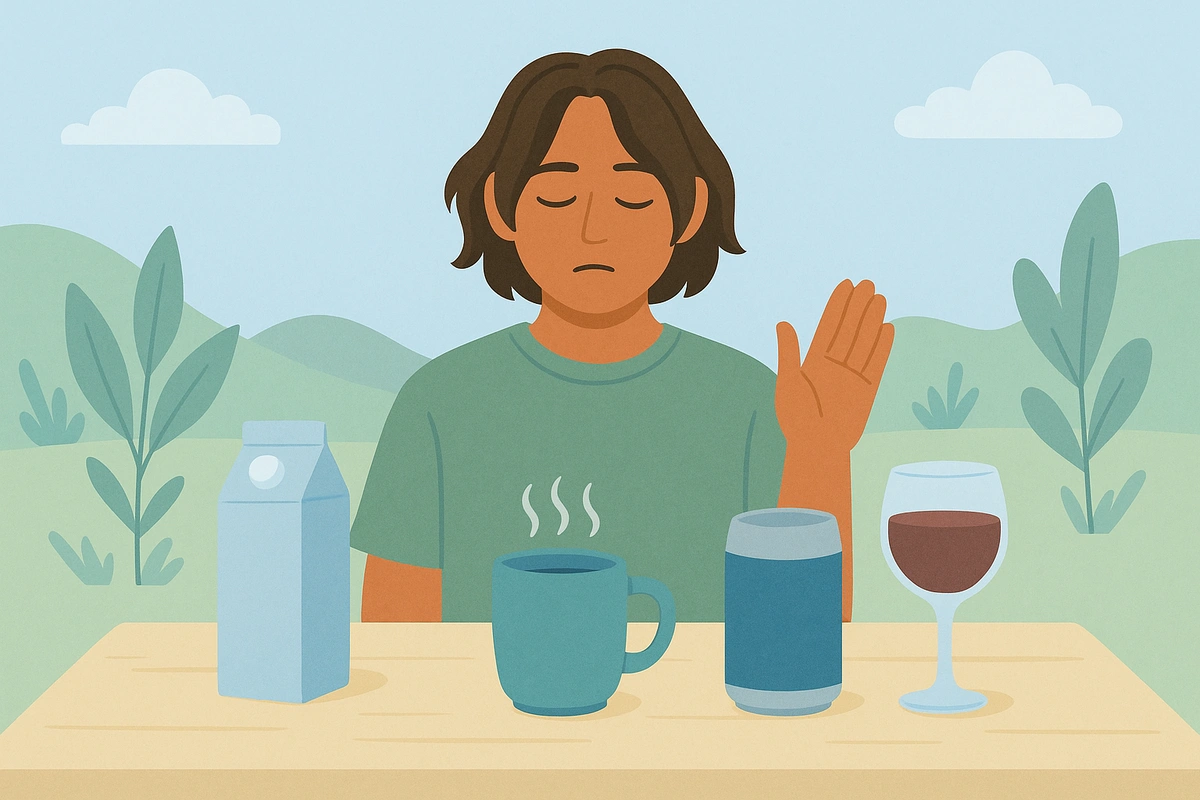Reduce your intake of caffeine, sugar, and alcohol to stabilize mood, improve sleep quality, and reduce anxiety symptoms through evidence-based dietary modifications.

Reducing caffeine, sugar, and alcohol involves gradually decreasing your consumption of these substances to minimize their anxiety-triggering effects on your nervous system. These dietary changes help stabilize blood sugar levels, improve sleep quality, and reduce the physiological stress responses that can worsen anxiety symptoms.
Many people don't realize how significantly these common substances can impact their mental health. Caffeine can trigger panic-like symptoms even in moderate amounts, sugar creates energy crashes that mimic anxiety episodes, and alcohol disrupts sleep patterns while creating withdrawal-related anxiety. By making strategic reductions in these areas, you can create a more stable internal environment that supports better emotional regulation and reduces anxiety triggers throughout your day.
Reducing caffeine, sugar, and alcohol works by addressing multiple physiological pathways that contribute to anxiety. Caffeine acts as a central nervous system stimulant that can trigger anxiety symptoms even in people without anxiety disorders. Research shows that high-dose caffeine consumption significantly increases anxiety risk, with some individuals being particularly sensitive to caffeine's anxiogenic effects.
Sugar creates rapid blood glucose fluctuations that can mimic or trigger anxiety symptoms. When blood sugar spikes quickly and then crashes, your body releases stress hormones including adrenaline and cortisol to stabilize glucose levels. This hormonal response produces physical sensations nearly identical to anxiety - rapid heartbeat, sweating, jitteriness, and nervousness. Studies have found that people with poor blood sugar regulation show symptoms that closely mirror mental health symptoms like irritability and anxiety.
Alcohol initially acts as a depressant, providing temporary relaxation by enhancing GABA activity in the brain. GABA (gamma-aminobutyric acid) is your brain's natural "brake pedal" - it's a chemical messenger that helps calm your nervous system and reduce feelings of stress and anxiety. Think of GABA as your brain's built-in relaxation system. However, as alcohol metabolizes, it causes a rebound effect that can increase anxiety. Even small amounts can disrupt sleep patterns, and the withdrawal process - which occurs even after moderate drinking - activates the same fight-or-flight response associated with anxiety disorders. This creates a cycle where people drink to manage anxiety, then experience increased anxiety as the alcohol wears off.
The physiological benefits of reducing these substances include more stable neurotransmitter levels, particularly serotonin and GABA, which are crucial for mood regulation. Better sleep quality naturally follows, which further supports emotional stability since sleep deprivation significantly increases anxiety sensitivity.
"I get severe headaches when I reduce caffeine" - This is common caffeine withdrawal. Reduce more slowly (by 10-15% weekly instead of 25%), stay extra hydrated, and consider small amounts of green tea which has less caffeine but may ease withdrawal. Headaches typically resolve within 3-7 days.
"My anxiety gets worse before it gets better" - Withdrawal can temporarily increase anxiety symptoms. This is usually a sign that the substance was masking underlying anxiety that needs other treatment approaches. Practice extra stress-reduction techniques and consider this a temporary phase that typically improves within 1-2 weeks.
"I can't function without my morning coffee" - Focus on maintaining the morning ritual with alternatives like herbal tea, warm water with lemon, or decaf coffee. Address the underlying sleep or energy issues - you may need better sleep hygiene or evaluation for medical conditions affecting energy.
"Social situations are difficult without alcohol" - Develop new social coping strategies like arriving early to events (when they're less overwhelming), bringing a supportive friend, having an exit plan, or practicing conversation starters. Consider whether social anxiety needs separate treatment.
"I experience intense sugar cravings" - Cravings often indicate blood sugar instability. Eat protein with every meal, choose complex carbohydrates, and have healthy snacks ready. Cravings typically decrease significantly after 2-3 weeks of stable blood sugar.
"I feel like I'm missing out or being antisocial" - Remember that prioritizing your mental health isn't antisocial - it's self-care. Find new ways to connect socially and communicate your needs to supportive friends and family members who will understand your health goals.